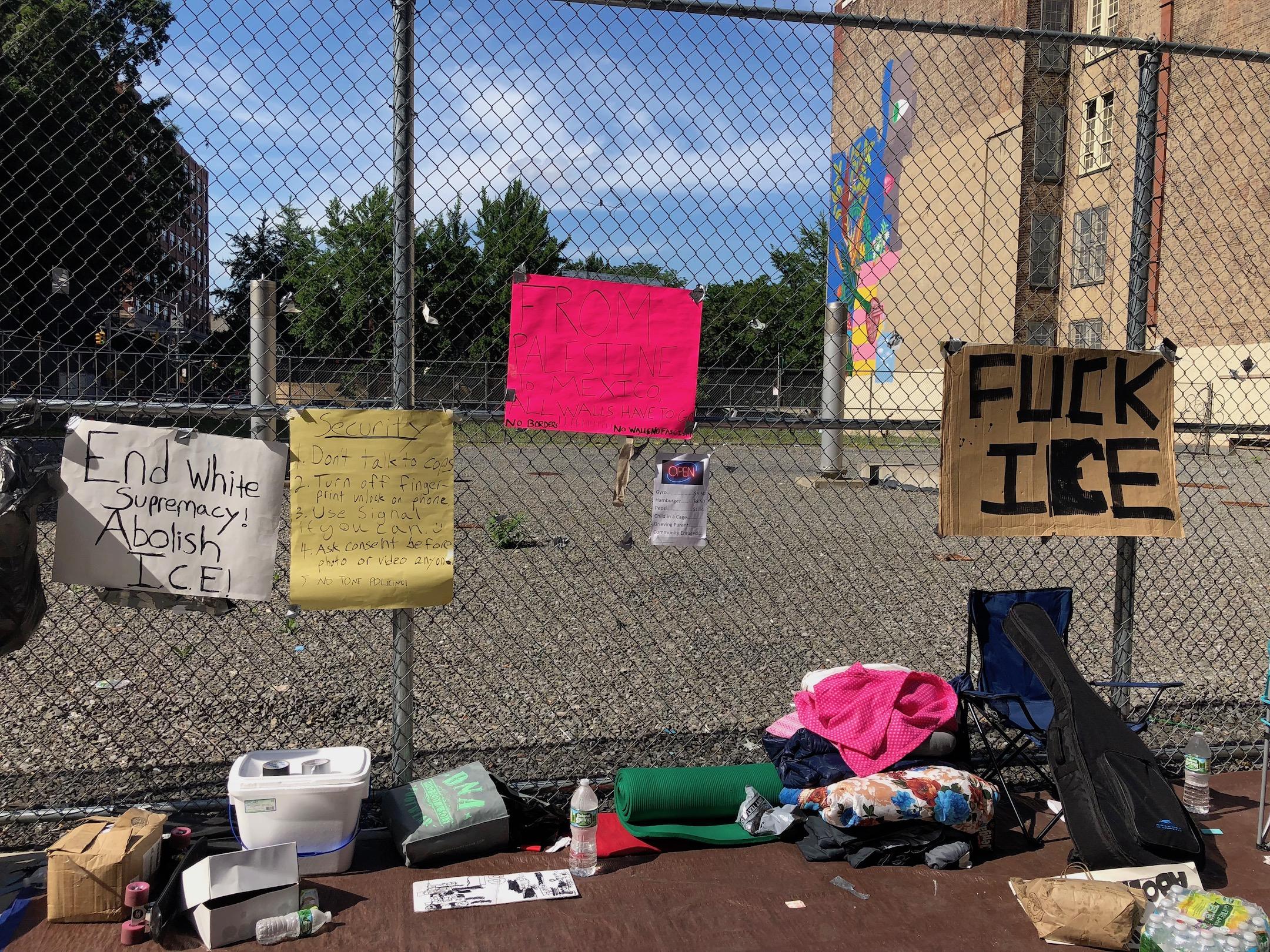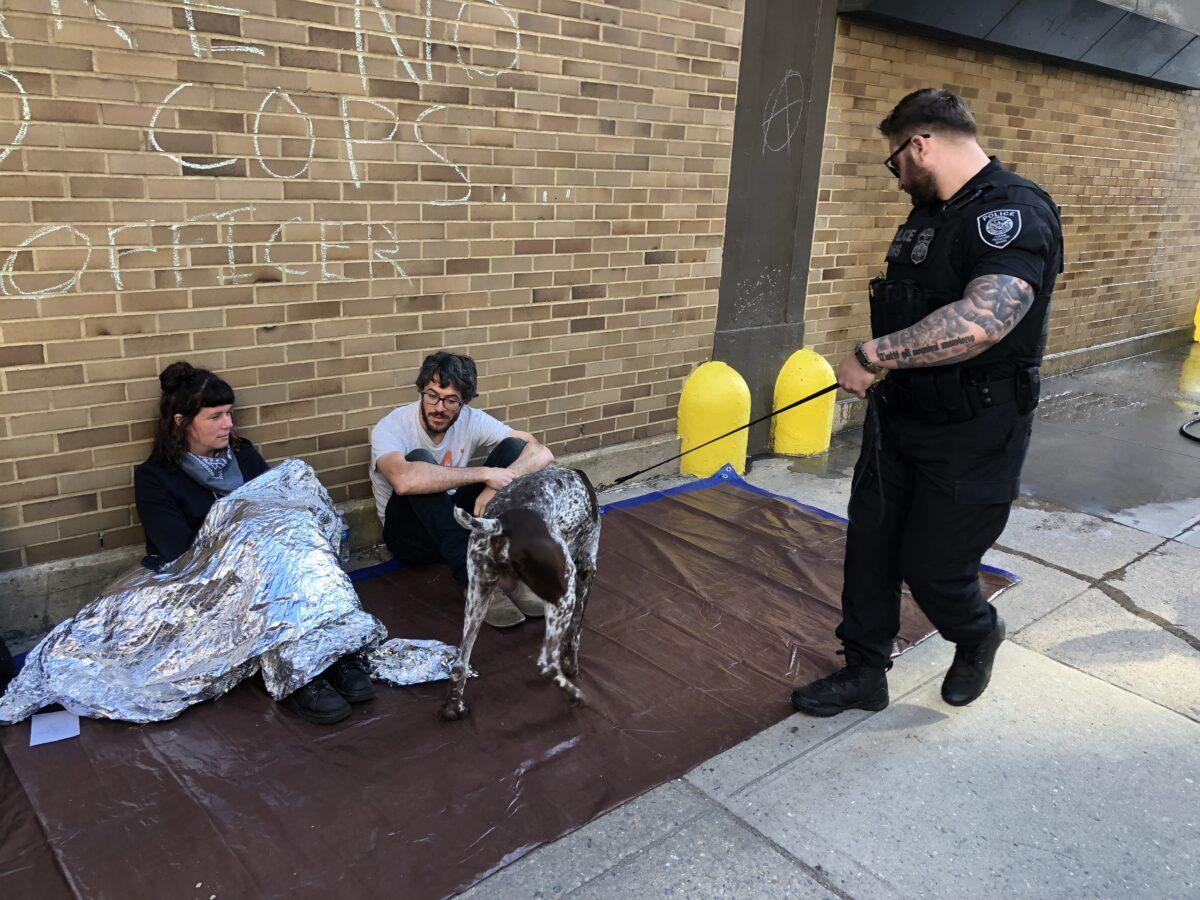ICE Limits Access To Lawyers For NYC Immigrants In Detention, Citing Protests
Advocates decry court’s shift to using teleconferencing for hearings.

On Sunday, President Trump called for abandoning due process for immigrants, tweeting, “When somebody comes in, we must immediately, with no Judges or Court Cases, bring them back from where they came.” In New York City, public defenders say ICE is showing a similar disregard, preventing detained immigrants from meeting with lawyers—and blaming it on protests nearby.
Members of the Metropolitan Anarchist Coordinating Council (MACC) launched an occupation of the immigration court at 201 Varick St. last week, inspired by similar ICE facility occupations cropping up nationally. Dozens of activists set up tarps and folding chairs in front of the building’s loading docks to prevent Department of Homeland Security vans from entering or exiting the building with detainees.
On Monday, ICE announced that all hearings at 201 Varick St. were canceled for the day. “This decision was made in order to ensure the safety of ICE employees, the court, the public and the detainees,” ICE spokesperson Rachael Yong Yow told The Appeal.
Occupiers agreed to move across the street and clear the loading dock areas Monday night, however, after public defenders and immigrant groups, including New Sanctuary NYC and Make the Road New York, stressed the negative consequences of disrupting bond hearings and other hearings aimed at client relief. “We wanted to work with immigrant communities,” Marisa Holmes, a spokesperson for MACC, said Tuesday. “We think being on the other side of the street is allowing hearings to continue, which is important.”
Yet ICE continued to refuse to transport detainees to the courthouse, citing safety concerns. The Executive Office for Immigration Review, which runs the court, confirmed Tuesday that rather than in-person hearings, it would use teleconferencing for all deportation and bond hearings, in which a defendant appears on a screen in the courtroom. Amanda St. Jean, a spokeswoman for the immigration review office confirmed the plan to use teleconferencing until it hears otherwise from ICE. It remained in place Wednesday, even though the occupation had dispersed entirely. “I think this claim that they are concerned about safety sounds like an excuse to punish the occupiers by punishing our clients,” said Scott Hechinger, senior staff attorney and director of policy for Brooklyn Defender Services.

The shift to teleconferencing upended client intake this week for the New York Immigrant Family Unity Project, a city-funded initiative that has offered free legal representation to detained immigrants facing deportation since 2013. Their services close a legal loophole, since the U.S. Constitution does not guarantee legal representation in immigration court and most of the city’s detained immigrants went unrepresented in court before the project began. The project’s attorneys meet with detained clients scheduled for intake at 201 Varick three times a week.
For project attorneys, intake is a chance to familiarize themselves with complex cases and begin exploring potential relief options, such as filing a green card application or a motion to cancel a removal. ICE recently set up a small area with interview rooms on the building’s 11th floor, where attorneys spend 20 to 40 minutes screening each new client. It is unclear if and how clients will be able to access attorneys now.
During hearings, the emotional advantage of in-person appearances is significant, according to the family unity project. Clients, many of whom have been detained for months, get to see family members in the courtroom. Over video, said Andrea Saenz, a supervising attorney for Brooklyn Defender Services who directs its family unity project contingent, “You can’t hand your client a tissue if they are crying. The judge might not see them as a real person, but as a person on a television show.”
No clients appeared on Wednesday morning. A list posted inside the court showed more than ten unrepresented detainees who would have likely had a chance to meet with the family unity project under normal circumstances, according to Brooklyn Defender Services attorney Zoey Jones.
“Our biggest concern is that now we have no way of communicating with these people,” Jones told The Appeal. “If we can’t speak to them, they won’t understand why they didn’t get to go to court today, or why they don’t have a lawyer.”
Public defenders consider ICE’s decision to cancel detainee transports for three days and counting retaliatory. “There aren’t even protesters there,” said Saenz. “I could have never guessed that this would be the outcome of a small protest, because 201 Varick has been the site of protests for years. I’ve seen people lying down in the street and that didn’t stop court hearings.”
ICE has used protests to justify similar moves elsewhere this month. In Oregon, legal presentations with local immigration attorneys were canceled on June 20, 21, and 22 because “the ICE building was inaccessible due to ongoing protests,” Carissa Cutrell, an ICE spokesperson, told The Appeal. In response to an ACLU lawsuit, a federal judge has ordered the government to provide lawyers with access to the detainees at Oregon’s FCI Sheridan for a minimum of six hours a day for at least the next month, as well as “know your rights” trainings and individualized interviews by attorneys with detainees.
ICE did not immediately respond to a request for comment Wednesday about when it would resume transports to 201 Varick St., although a court employee told one family unity project attorney that operations could be back to normal as soon as tomorrow.
Cory Forman, another attorney who works with immigrants at Varick Street, had a different take after speaking with an ICE representative this week. “They feel that transporting detainees to court poses a risk to their officer’s safety, based on threats that they’ve received and the blocking of vans,” he said. “I specifically asked if this was going to be permanent, how long is this going to go on, and the impression I got is that it will definitely be for the foreseeable future and as long as they feel there’s a risk of safety to their officers, that’s what’s going to happen.”
ICE did not immediately respond to a request for comment on detainees’ access to legal assistance.
“The main thing that’s concerning me right now is simply getting people lawyers to help with cases,” Saenz said. According to Saenz, most of her clients are in detention for at least two months before their first court date.
“While people are sitting and waiting in detention and they don’t have lawyers, some of them are going to give up. They will just say, ‘Deport me.’ And that’s heartbreaking.”
This story has been updated with quotes from Cory Forman. Additional reporting by Max Rivlin-Nadler.
